Many of us listen to NPR when we listen to radio, and of those of us who listen, we have long listened to the snippets of stories presented by StoryCorp. What fewer people know is that I earn a living (well, something close enough to a living to squeak by) by working for an organization that does often-similar work, the Jewish Women's Archive. Among our projects, we work with local historical societies to help uncover, gather, disseminate, and preserve North American Jewish women's stories. We are always looking for better ways that a small organization (us) can facilitate the uncovering of more stories (so very many).
I was thinking about that work this morning as I listened to NPR talk about StoryCorp's "National Day of Listening" project, in which all of us are invited to spend the day after Thanksgiving, not shopping, but listening to someone significant in our lives—gathering their stories and preserving them for our kids and grandkids. They even have a great, downloadable guide to recording these stories. (If you are having trouble starting the conversation, it just so happens that the Jewish Women's Archive has a useful webpage, "20 Questions to Ask the Important Women in Your Life"). Sounds quaint and homey until you realize how significant specific Jewish women have been to our extant sense of Jewish culture.
Some of the women we celebrate include Ruth Rubin, whose recordings and books of Jewish folk songs were the first entry point for so many. Start with a few of her articles on the KlezmerShack. Bronya Sakina, whose life has never been adequately documented, passed on many songs to Michael Alpert and others before passing away. We have living treasures such as Flory Jagoda and Bayle Schaechter-Gottesman, both National Medal of Honor winners for their contributions to Sephardic and Yiddish poetry and folksinging. Drummer Elaine Hoffman Watts is the mother of the next musical link in the family chain, Susan. Younger women who have played critical roles in the revival of Yiddish culture include Adrienne Cooper and Alicia Svigals—catch them while they are still vigorous, still teaching!
But the point isn't to honor famous Jewish women (or more generally, famous people). It is to gather the stories and wisdom of the people around you, from your grandparents and teachers; from people you meet at schools & synagogues—wherever people gather and share culture that they, in turn, learned from their elders.
While I'm at it, let me also encourage people to upload their own performances and share them. Both YouTube and the Internet Archive accept recordings for free, and make them universally available to anyone around the world who has access to the internet.
On Passover, we will retell a story about an ancient exodus from Egypt, but we are commanded, as part of the mitzvah, to retell it every year, in our times. The "National Day of Listening" is part of how one realizes that mitzvah. By learning and preserving the stories of those who came before us, we also give ourselves deeper knowledge and fertile soil in which to grow the stories that capture our own times. Often, our new stories will be retellings and reimaginings that come directly from those we learn from others. Some are new and could only have been sung or told today. But even the new, needs the old for context, lest it be seen and understood as just more digital detritis.
So, do some listening this coming Friday. Where possible, do some recording. If you post stories online, write me and let me know. I'll post some links here on the KlezmerShack to help get the word out. To be Jewish, or to understand Jewish culture, after all, is to have both past and future richly part of the present.
Oh, and while I have your attention? Like all non-profits, the Jewish Women's Archive relies on your help, and actual donations to keep the doors open and the website online. Once you have done some listening this week, do take a moment to participate in our year-end appeal.
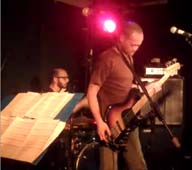 On a recent quick trip to Israel I managed to catch one of the bands I have most wanted to see, Kruzenshtern and Parahod (קרוזנשטרן ופרחוד). I have reviewed a couple of their CDs here on the KlezmerShack, starting with their first,
On a recent quick trip to Israel I managed to catch one of the bands I have most wanted to see, Kruzenshtern and Parahod (קרוזנשטרן ופרחוד). I have reviewed a couple of their CDs here on the KlezmerShack, starting with their first, 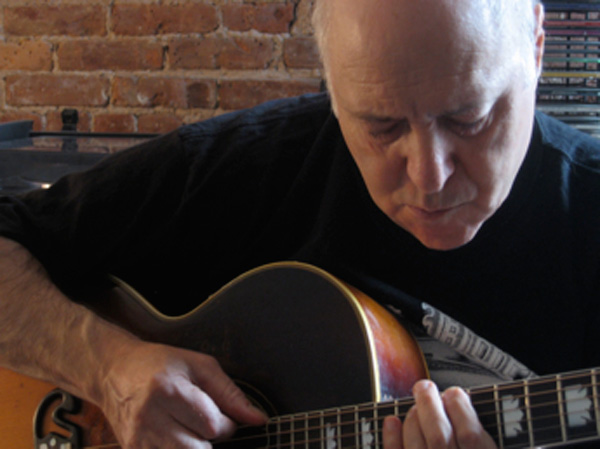 Yesterday was a wonderful music day, full of contrast and interconnection. Early in the afternoon I wandered over to Club Passim, in Cambridge, where they have been holding an annual "campfire" series--continuous music, mostly by younger artists, non-stop from noon to midnite, over the whole weekend. It's an interesting mix of bands that looked like a lot of Celtic music and singer-songwriters. This is not a bad thing at all, but it contrasted bluntly with the recent Old Town Folk Fest I attended in Chicago in which the Old Town Music School hosted a lively festival in a local park with the staff bands (just considering the staff bands) ranging from hillbilly to African drumming. I adore Club Passim and have attended some of my favorite shows of all time there. For 50 years (not always under the same name) it has been a place to find good traditional music and the excellent things that come therefrom. The campfire festival may not fairly represent the span of the club and it's associated school's offerings. But I did note the difference from Old Town.
Yesterday was a wonderful music day, full of contrast and interconnection. Early in the afternoon I wandered over to Club Passim, in Cambridge, where they have been holding an annual "campfire" series--continuous music, mostly by younger artists, non-stop from noon to midnite, over the whole weekend. It's an interesting mix of bands that looked like a lot of Celtic music and singer-songwriters. This is not a bad thing at all, but it contrasted bluntly with the recent Old Town Folk Fest I attended in Chicago in which the Old Town Music School hosted a lively festival in a local park with the staff bands (just considering the staff bands) ranging from hillbilly to African drumming. I adore Club Passim and have attended some of my favorite shows of all time there. For 50 years (not always under the same name) it has been a place to find good traditional music and the excellent things that come therefrom. The campfire festival may not fairly represent the span of the club and it's associated school's offerings. But I did note the difference from Old Town.
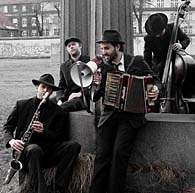 So, a while back, someone clueless in the UK wrote about how only jerks ignorant of "current" Jewish culture would be caught up in lifeless klezmer concerts vs., say, the Ramones or Leonard Cohen. Personally, I dig both, but don't actually think of their work as "Jewish" or substitute for same.
So, a while back, someone clueless in the UK wrote about how only jerks ignorant of "current" Jewish culture would be caught up in lifeless klezmer concerts vs., say, the Ramones or Leonard Cohen. Personally, I dig both, but don't actually think of their work as "Jewish" or substitute for same. Oh, yeah. My stepson used to play with Alinsky's grandson, as sweet a kid as you could ask to know. Slandering Alinsky is slandering my son's friends. Feh. If your state allows early voting, get your rear in gear and vote so that you can spend nov 4th helping get out the vote and getting people to the polls. Me? I'll be helping said stepson, who is running a campaign for state senate for a mensh of a candidate. I guess that Alinsky stuff wore off on him. He can do a decent freilach on the sax when pushed, too.
Oh, yeah. My stepson used to play with Alinsky's grandson, as sweet a kid as you could ask to know. Slandering Alinsky is slandering my son's friends. Feh. If your state allows early voting, get your rear in gear and vote so that you can spend nov 4th helping get out the vote and getting people to the polls. Me? I'll be helping said stepson, who is running a campaign for state senate for a mensh of a candidate. I guess that Alinsky stuff wore off on him. He can do a decent freilach on the sax when pushed, too. Hey, I got it on the grapevine by reading the original
Hey, I got it on the grapevine by reading the original 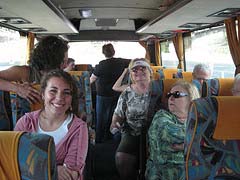 hi, well, it wasn't called LadinoBus, but that's what it was—I'm just back in Madrid from a couple of weeks hanging out on a bus careening through Turkey with a bunch of Sephardim mostly in their 70s and 80s, speaking Ladino (which is what most of them have resignedly taking to calling it these days; it isn't what any of them said at home) and visiting the cities they or their parents were born in; then a week in Bulgaria mostly with Sephardim as well, in their case mostly resisting the use of the term "Ladino" ("we don't care what they've decided in Turkey or Israel; Ladino isn't what is spoken"). I was on the Turkey trip as a sort of domesticated ethnomusicologist, and it was quite fascinating to see what memories of songs (and stories, recipes, proverbs etc ) the trip stirred up, between the places themselves, the interaction with others on the bus, and the interaction with Sephardim who had stayed in these cities all along.…
hi, well, it wasn't called LadinoBus, but that's what it was—I'm just back in Madrid from a couple of weeks hanging out on a bus careening through Turkey with a bunch of Sephardim mostly in their 70s and 80s, speaking Ladino (which is what most of them have resignedly taking to calling it these days; it isn't what any of them said at home) and visiting the cities they or their parents were born in; then a week in Bulgaria mostly with Sephardim as well, in their case mostly resisting the use of the term "Ladino" ("we don't care what they've decided in Turkey or Israel; Ladino isn't what is spoken"). I was on the Turkey trip as a sort of domesticated ethnomusicologist, and it was quite fascinating to see what memories of songs (and stories, recipes, proverbs etc ) the trip stirred up, between the places themselves, the interaction with others on the bus, and the interaction with Sephardim who had stayed in these cities all along.…
 The only thing that could pull me away from the Yiddish Dance confab this Sunday is a differently amazing event happening nearby. Jonathan Boyarin and Elissa Sampson are old friends who have spent much of the last 20 or 30 years working to preserve synagogues on the Lower East Side. I have davened in firetraps up and down the area, and a couple of them are actually rebuilt or being rebuilt, largely as a result of Sampson's and Boyarin's efforts.
The only thing that could pull me away from the Yiddish Dance confab this Sunday is a differently amazing event happening nearby. Jonathan Boyarin and Elissa Sampson are old friends who have spent much of the last 20 or 30 years working to preserve synagogues on the Lower East Side. I have davened in firetraps up and down the area, and a couple of them are actually rebuilt or being rebuilt, largely as a result of Sampson's and Boyarin's efforts. There is something special about a band marching in a parade. It doesn't have to be an "official" marching band, as at Veteran's Day parades or football games. When I lived in Santa Cruz I remember some glorious marches with a delightful cacophony of musicians and street performers. Anyone who has attended a Gay Pride parade knows of what I speak—but so do the people who have attended Mardi Gras in New Orleans.
There is something special about a band marching in a parade. It doesn't have to be an "official" marching band, as at Veteran's Day parades or football games. When I lived in Santa Cruz I remember some glorious marches with a delightful cacophony of musicians and street performers. Anyone who has attended a Gay Pride parade knows of what I speak—but so do the people who have attended Mardi Gras in New Orleans. As I get ready to start the first seder, I find myself thinking about music for Passover. It is a holiday where I find myself singing loudly (to many people's distress) and often, but not one where there are so many recordings that come to mind.
As I get ready to start the first seder, I find myself thinking about music for Passover. It is a holiday where I find myself singing loudly (to many people's distress) and often, but not one where there are so many recordings that come to mind.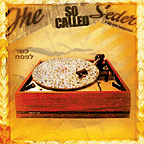 Passover starts Monday night at sundown. Many of you will gather with friends and family for 4 cups of wine, 4 questions, and more dry, flat, unleavened bread than you'd care to think about. Socalled's Passover masterpiece: The Socalled Seder: A Hip Hop Haggadah is the perfect antidote to a seder as dry as the matzah you're going to eat. It makes a great Afikomen prize. Whether you drink the 4 cups or not, its a great sountrack to the first week of April.
Passover starts Monday night at sundown. Many of you will gather with friends and family for 4 cups of wine, 4 questions, and more dry, flat, unleavened bread than you'd care to think about. Socalled's Passover masterpiece: The Socalled Seder: A Hip Hop Haggadah is the perfect antidote to a seder as dry as the matzah you're going to eat. It makes a great Afikomen prize. Whether you drink the 4 cups or not, its a great sountrack to the first week of April.  I first noticed right before Rosh Hashana when I got an email informing me that something called "the board" had kicked off the Jewish satirist who makes fun of Kazakstan (sorry, I mostly track unpopular culture, so I am fuzzy on who does what) because the Kazak government objected to his satire and it was embarrassing to Jews. I replied with a pithy reminder of Spinoza, also excommunicated primarily because of fears of what the goyim would think.
I first noticed right before Rosh Hashana when I got an email informing me that something called "the board" had kicked off the Jewish satirist who makes fun of Kazakstan (sorry, I mostly track unpopular culture, so I am fuzzy on who does what) because the Kazak government objected to his satire and it was embarrassing to Jews. I replied with a pithy reminder of Spinoza, also excommunicated primarily because of fears of what the goyim would think.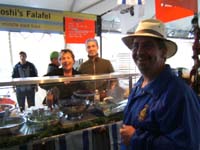
 Several times in the last few months I have been reminded of Shanghai as a Jewish refuge of the 1930s and 1940s. While viewing the film, "The White Countess" a month or two ago, I found myself sure that this was not the first time in recent memory that I had seen a film that involved China during that period, and that featured Jews (or could have featured Jews). Now the folks at Winter & Winter have released a DVD of 1998's excellent documentary, "Zuflucht in Shanghai: The Port of Last Resort", describing the wide-open port, the only place in the world where one needed no papers, which provided refuge to some 20,000 Jews as Europe was consumed by Holocaust. Despite the alliance of Japanese with the Germans, the Japanese initially favored Jews in Shanghai, and even at the height of war hysteria when food was limited everywhere and Jews were confined to a ghetto, most of those who arrived, survived, and eventually found their ways after the war to the US or Israel, with a few eventually repatriated to Europe after the Communist takeover.
Several times in the last few months I have been reminded of Shanghai as a Jewish refuge of the 1930s and 1940s. While viewing the film, "The White Countess" a month or two ago, I found myself sure that this was not the first time in recent memory that I had seen a film that involved China during that period, and that featured Jews (or could have featured Jews). Now the folks at Winter & Winter have released a DVD of 1998's excellent documentary, "Zuflucht in Shanghai: The Port of Last Resort", describing the wide-open port, the only place in the world where one needed no papers, which provided refuge to some 20,000 Jews as Europe was consumed by Holocaust. Despite the alliance of Japanese with the Germans, the Japanese initially favored Jews in Shanghai, and even at the height of war hysteria when food was limited everywhere and Jews were confined to a ghetto, most of those who arrived, survived, and eventually found their ways after the war to the US or Israel, with a few eventually repatriated to Europe after the Communist takeover.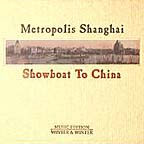 The documentary, by Joan Grossman and Paul Rosdy, featuring soundtrack music by John Zorn, is excellent. It features a wealth of contemporaneous letters and photos, interspersed with interviews with four of the survivors. Winter & Winter have done their usual very classy job of producing a well-documented, beautiful DVD package. So taken was Stefan Winter by the story, that he also created a separate CD "soundscape" featuring music by
The documentary, by Joan Grossman and Paul Rosdy, featuring soundtrack music by John Zorn, is excellent. It features a wealth of contemporaneous letters and photos, interspersed with interviews with four of the survivors. Winter & Winter have done their usual very classy job of producing a well-documented, beautiful DVD package. So taken was Stefan Winter by the story, that he also created a separate CD "soundscape" featuring music by 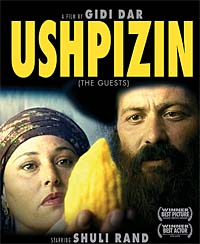 For the last couple of weeks, people here in Boston have been talking about this amazing new Israeli film, "
For the last couple of weeks, people here in Boston have been talking about this amazing new Israeli film, "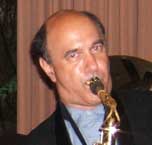

 Do you have a favorite Passover recording? Is there something that your kids love to listen to every year?
Do you have a favorite Passover recording? Is there something that your kids love to listen to every year?